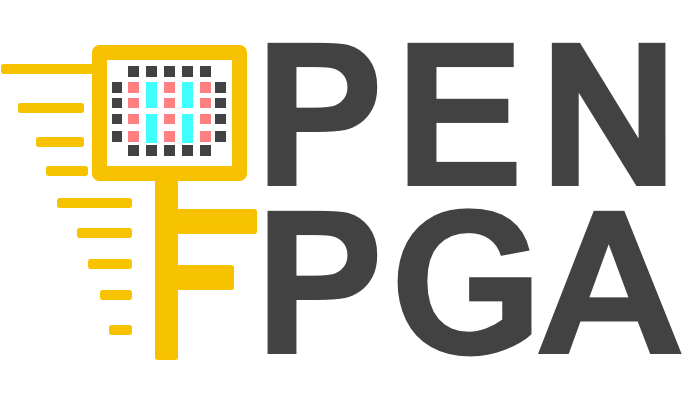|
|
||
|---|---|---|
| .travis | ||
| abc | ||
| ace2 | ||
| cmake | ||
| docs | ||
| libopenfpga | ||
| libs | ||
| openfpga | ||
| openfpga_flow | ||
| vpr | ||
| yosys | ||
| .dockerignore | ||
| .gitignore | ||
| .gitmodules | ||
| .travis.yml | ||
| CMakeLists.txt | ||
| Dockerfile | ||
| LICENSE | ||
| README.md | ||
| README_Benchmarks.md | ||
| deploy_key.enc | ||
| openfpga.sh | ||
| run_local.bat | ||
| run_local.sh | ||
| run_test.sh | ||
README.md
Getting Started with OpenFPGA 
Introduction
The OpenFPGA framework is the first open-source FPGA IP generator supporting highly-customizable homogeneous FPGA architectures. OpenFPGA provides a full set of EDA support for customized FPGAs, including Verilog-to-bitstream generation and self-testing verification. OpenFPGA opens the door to democratizing FPGA technology and EDA techniques, with agile prototyping approaches and constantly evolving EDA tools for chip designers and researchers.
Compilation
Dependencies and help using docker can be found here.
Compilation Steps:
# Clone the repository and go inside it
git clone https://github.com/LNIS-Projects/OpenFPGA.git && cd OpenFPGA
mkdir build && cd build # Create a folder named build in the OpenPFGA repository
cmake .. # Create a Makefile in this folder using cmake
make # Compile the tool and its dependencies
cmake3.12 is recommended to compile OpenFPGA with GUI
Quick Compilation Verification To quickly verify the tool is well compiled, user can run the following command from OpenFPGA root repository.
python3 openfpga_flow/scripts/run_fpga_task.py compilation_verification --debug --show_thread_logs
Python3 and iVerilog v10.1+ are required. GUI will pop-up if enabled during compilation.
Supported Operating Systems We currently target OpenFPGA for:
- Ubuntu 18.04
- Red Hat 7.5
The tool was tested with these operating systems. It might work with earlier versions and other distributions.
Documentation
OpenFPGA's full documentation includes tutorials, descriptions of the design flow, and tool options.
Tutorials
You can find some tutorials in the ./tutorials folder. This will help you get more familiar with the tool and use OpenFPGA under different configurations.